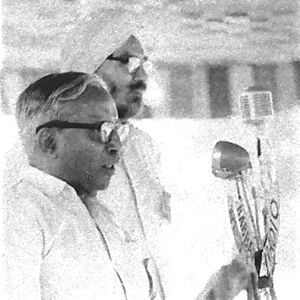Jagjit Singh Lyallpuri facts for kids
Quick facts for kids
Jagjit Singh Lyallpuri
|
|
|---|---|

E. M. S. Namboodiripad (left) with Lyallpuri in 1966
|
|
| Born | 10 April 1917 Lyallpur, Punjab, British India
|
| Died | 27 May 2013 (aged 96) Ludhiana, Punjab, India
|
| Alma mater | Khalsa College, Amritsar Government Law College, Lahore |
| Political party | Indian National Congress (1935–1940) Punjab Kirti Kisan Party (1940–1944) Communist Party of India (1944–1964) Communist Party of India (Marxist) (1964–1992) Marxist Communist Party of India (1992–2005) Marxist Communist Party of India (United) (from 2005) |
Jagjit Singh Lyallpuri (born April 10, 1917 – died May 27, 2013) was an important Indian politician. He was known for being one of the oldest living members who helped start the Communist Party of India (Marxist). He dedicated his life to working for farmers and workers.
Contents
A Young Activist's Journey
Before India became independent and split into India and Pakistan, Jagjit Singh Lyallpuri's family owned a lot of land in a place called Lyallpur. This area is now in Pakistan. Young Lyallpuri became interested in politics during his student days in the 1930s.
After finishing his science degree at Khalsa College in Amritsar, he joined the Indian National Congress when he was 18. His parents wanted him to have a regular job, but he chose to be a political activist.
Lyallpuri studied law and got his degree from Government Law College in Lahore in 1940. Soon, he became a full-time revolutionary and a leader in the Kirti Kisan Party. This party worked for farmers and workers. He joined the party's main committee and became a leader of the Punjab Kisan Sabha, a farmers' organization. Later, the Kirti Kisan Party joined the Communist Party of India.
Life After India's Partition
After India was divided in 1947, Lyallpuri moved to Ludhiana in India. Inside the Communist Party, he disagreed with some leaders who wanted to start small, armed fights.
Lyallpuri was put in jail from 1949 to 1951 because the Communist Party was banned. While in jail, party leaders told him to start a protest among the prisoners. This led to riots and a hunger strike, where he refused to eat for nine weeks.
In April 1953, he was chosen as a Joint Secretary of the All India Kisan Sabha, a big farmers' organization. He held this important position for 18 years.
Lyallpuri was also a member of the National Council of the Communist Party of India. He was elected to this council in 1958. In 1961, he became the general secretary of the All India Kisan Sabha. In 1959, Lyallpuri and Harkishan Singh Surjit led a big protest by farmers against a tax called the Khush Hasiyati Tax. This protest was organized by the Communist Party in Punjab.
Joining CPI(M)
In 1964, Jagjit Singh Lyallpuri helped create the Communist Party of India (Marxist) (CPI(M)). This happened after a split in the original Communist Party of India. He was one of the first members of the new party's main committee. He continued to be the general secretary of the All India Kisan Sabha until 1968.
Lyallpuri was jailed again during the Emergency in 1975. This was a time when special rules were put in place across India.
During his time as a CPI(M) leader, Lyallpuri often had disagreements with the party's main leaders. In the 1980 Punjab Legislative Assembly election, he ran for a seat in Ludhiana Rural. He came in second place in that election.
A Leader of New Movements
In 1992, Lyallpuri led a group that left the CPI(M). They did this because they disagreed with the party getting closer to the Congress Party. Lyallpuri and other leaders who left the CPI(M) then joined the Marxist Communist Party of India. Lyallpuri became the general secretary of this new party.
When the Marxist Communist Party of India (United) was formed in 2005, Lyallpuri became its general secretary as well.
His Autobiography
In 2010, Jagjit Singh Lyallpuri shared his life story in a book. It was called My Life My Times.
 | Misty Copeland |
 | Raven Wilkinson |
 | Debra Austin |
 | Aesha Ash |

